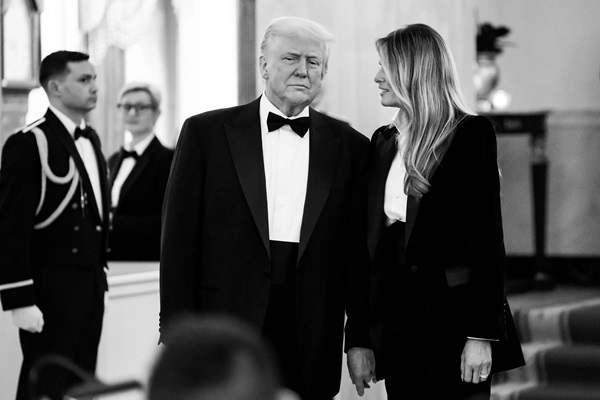.png)

Vijay Singh Chauhan, a former IRS official, is a trade expert and Senior Visiting Fellow at Isaac Centre for Public Policy, Ashoka University.
May 7, 2025 at 1:59 AM IST
Many had seen it coming. But few expected it to arrive quite like this.
Ever since Donald Trump began using tariffs as a blunt-force tool to bring manufacturing back to American shores, the question kept cropping up: could the US ever go so far as to impose tariffs on services? The consensus was clear: unlikely, at least not any time soon. The complexities were too great and the trade-offs too steep.
But that unlikely future just arrived. Abruptly, and with a flourish of unpredictability.
In a typical burst of headline-grabbing drama, Trump announced he had authorised the relevant agencies to initiate the process of imposing a 100% tariff on all foreign films entering the US. “WE WANT MOVIES MADE IN AMERICA, AGAIN!” he declared, lamenting that the American film industry was dying a “very fast death” due to incentives being offered by other countries to their domestic producers.
Plot Holes
The announcement was short on details, as in the earlier tariff announcements. But one thing is clear: the US is now ready to tax what was previously considered untaxable. And this isn’t just about movies. This is about services. This is about digital trade. And about opening a door that has long remained bolted—for good reason.
Tariffs on services are a different beast altogether. Unlike goods, which are physically verifiable and subject to well-established valuation and classification systems, services, especially digital ones, are harder to track, price, or even define at the border. In India, the journey from taxing just four services in 1994 to bringing the entire services economy under the Goods and Services Tax regime in 2017 is a story of how messy this space can get. Taxing services involves a maze of jurisdictional and definitional challenges, as any indirect tax expert will attest. Films are no exception.
International rules are equally underdeveloped. The WTO, for all its success in evolving rules on trade in goods, including tariff bindings, and Most Favoured Nation obligations has fared far worse on services. Since 1998, the WTO has enforced a moratorium on customs duties on electronic transmissions—a blanket that covers everything from e-books to music and films streamed or downloaded. Originally intended for two years, it has been extended repeatedly, most recently until 2026 at the 13th Ministerial Conference in Abu Dhabi.
Digital Dilemma
While some developing countries, including India and South Africa, have called for an end to this moratorium, arguing that it curbs their policy space and tariff revenue, the developed world, led by the US, has so far held the line in favour of duty-free digital trade. Ironically, the US has been its biggest beneficiary, thanks to its dominance in global e-commerce, streaming services, and digital platforms.
That’s what makes this move even more baffling. With this single announcement, Trump has taken aim not only at foreign film producers, but also at the very structure of digital trade that American firms have built and profited from for decades. Even if the current plan targets only theatre releases of foreign films, it inevitably raises the question: what about streaming platforms? What about paid downloads? What if Netflix picks up an Indian or Korean original, does that become taxable content? Do we now distinguish between what’s made FOR the US and what’s made IN the US?
From India’s perspective, this raises multiple concerns. Bollywood, while not a juggernaut in the US market, has a steady and growing presence. A few films, like Pathaan, RRR, Dangal, have broken out in US theatres, drawing both diaspora audiences and international attention. More importantly, Indian content has become a fixture on OTT platforms. It’s not just entertainment; it’s intellectual property, licensing, and the monetisation of cross-border content.
Films, after all, are complex intellectual property products, involving global talent, cross-border financing, and increasingly, multi-platform distribution. The implications of taxing such digital content at entry are messy, to say the least. If a US distributor legally acquires a foreign film, pays licensing fees, and complies with copyright laws, how and why should it face a punitive tariff? Would co-productions be exempt? Would a Hollywood studio film shot in Dubai, edited in Chennai, and released in California be considered foreign or domestic?
And what next? Perhaps the biggest can of worms this announcement opens is around tech and professional services, areas where India has significant stakes. The US runs a surplus in services trade with many countries, but not with India. India’s IT and business process outsourcing industry earns billions from the US, offering everything from software services to consulting and remote diagnostics. These are the very sectors that could be next in line if tariffs on “foreign” services become politically attractive.
It’s worth remembering that the logic behind Trump’s “reciprocal tariff” announcements has always been skewed. His administration focused largely on the trade deficit in goods, ignoring the services surplus the US enjoys with many of its trading partners. If that accounting were more balanced, factoring in the dominance of US firms in global services, the rhetoric of victimhood would lose its sting.
But that’s the nature of disruptive trade moves. They don’t follow economic logic; they follow electoral instincts. Or perhaps game theory expertise. What began as a populist jab at foreign films could very well morph into a broader assault on cross-border services. And once tariffs enter the services lexicon, it won’t stop with movies.
For now, the tariff threat may seem symbolic. But symbolism matters, especially when it chips away at long-standing trade norms and unsettles the fragile consensus on digital commerce.
As they say, abhi toh picture baaki hai!
*Views expressed are personal



